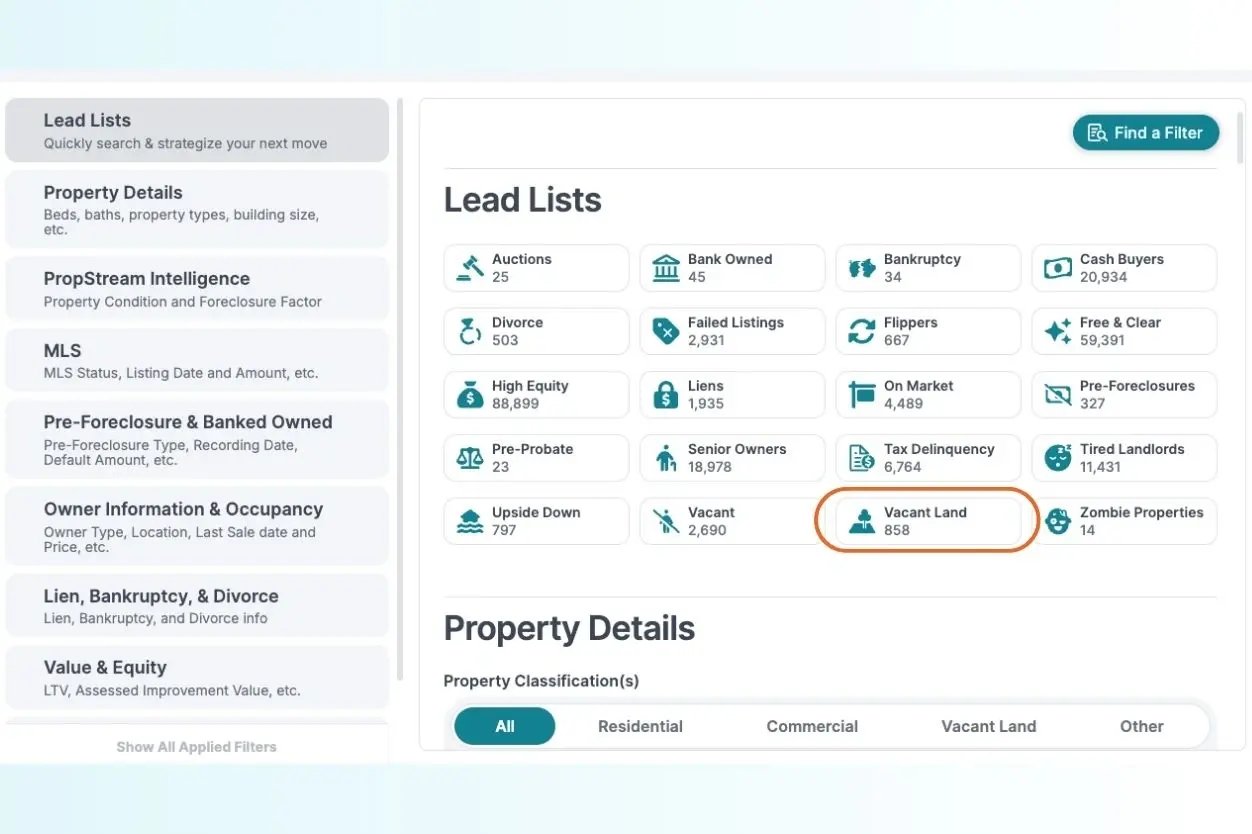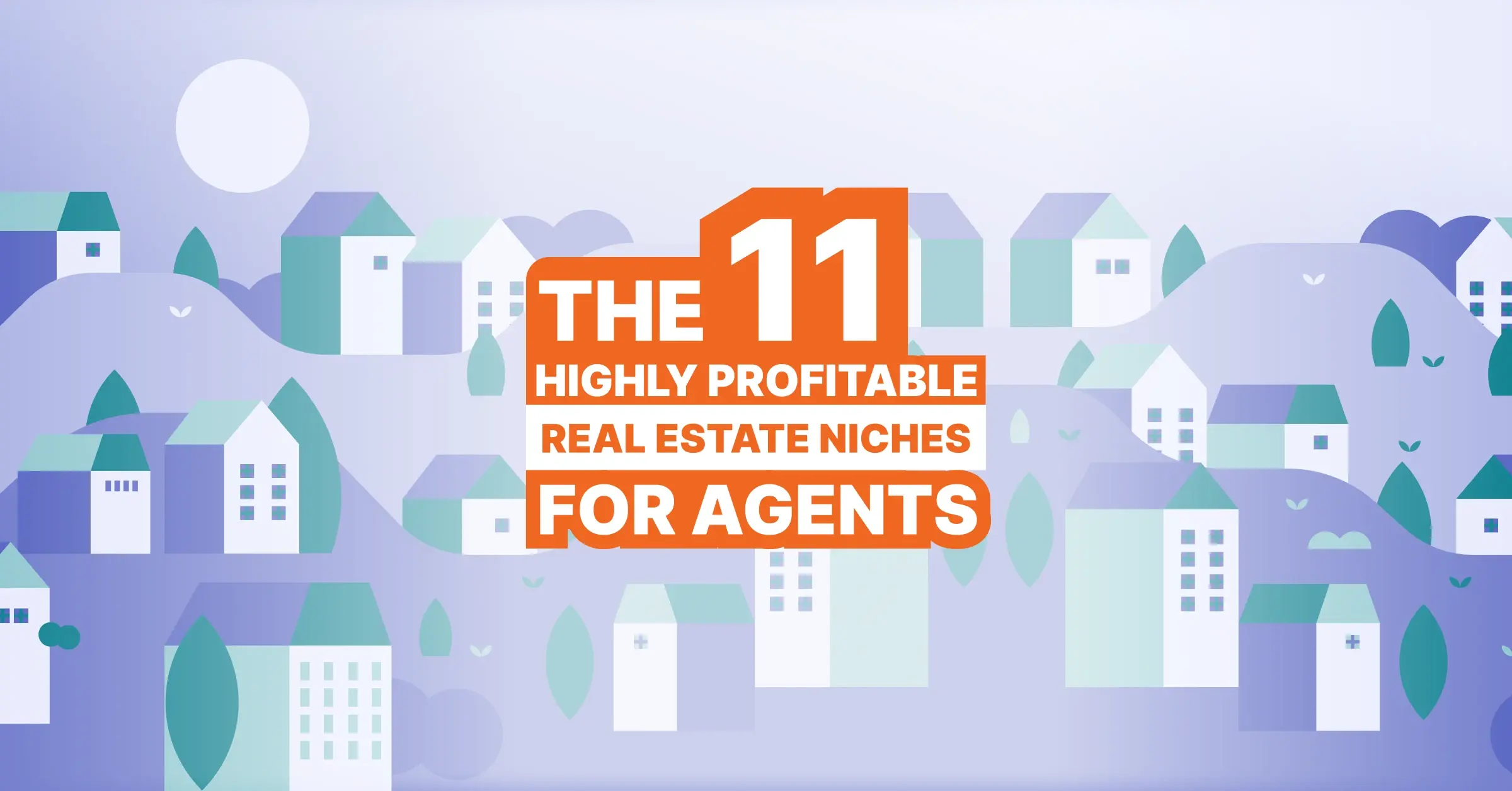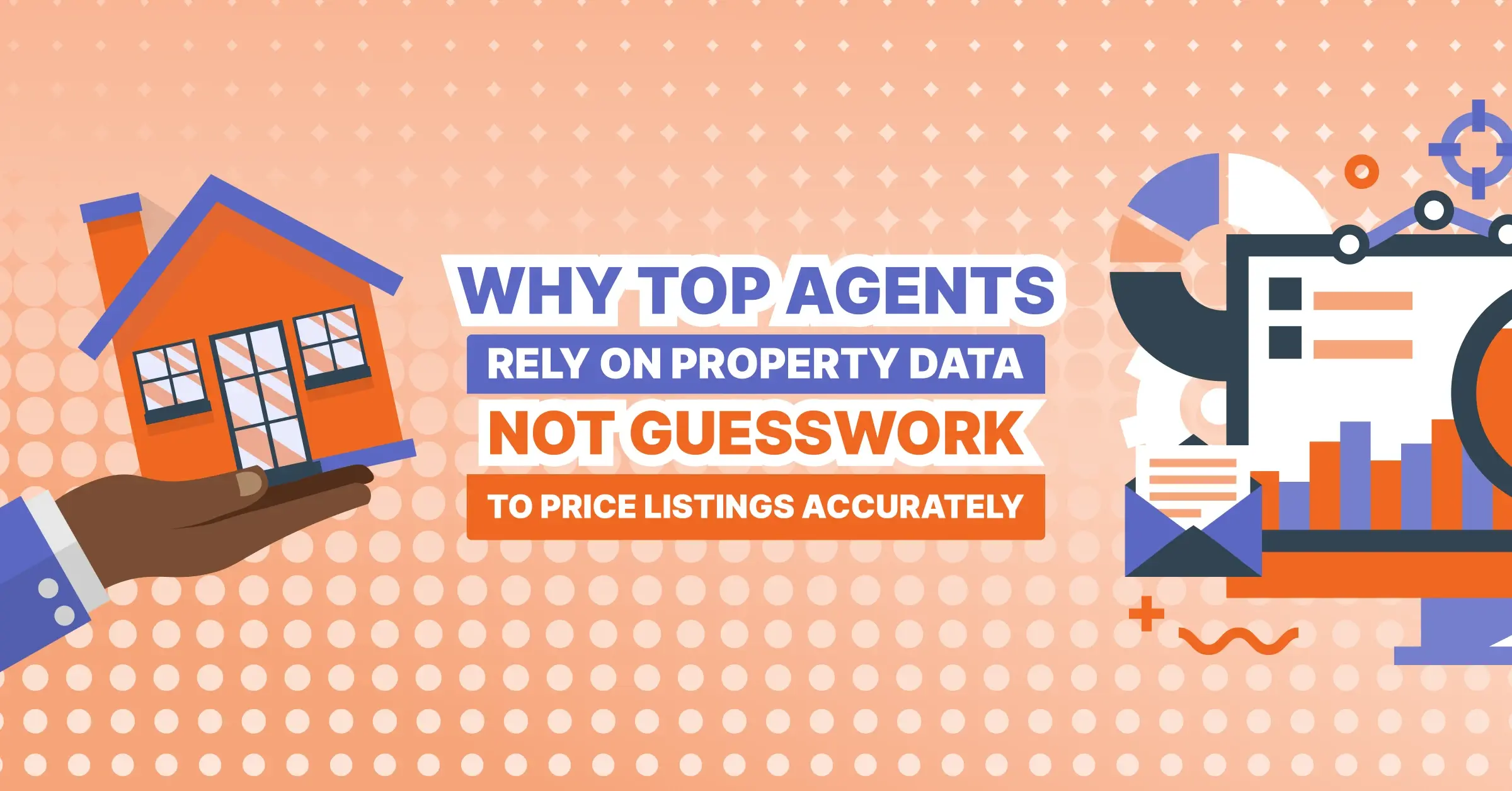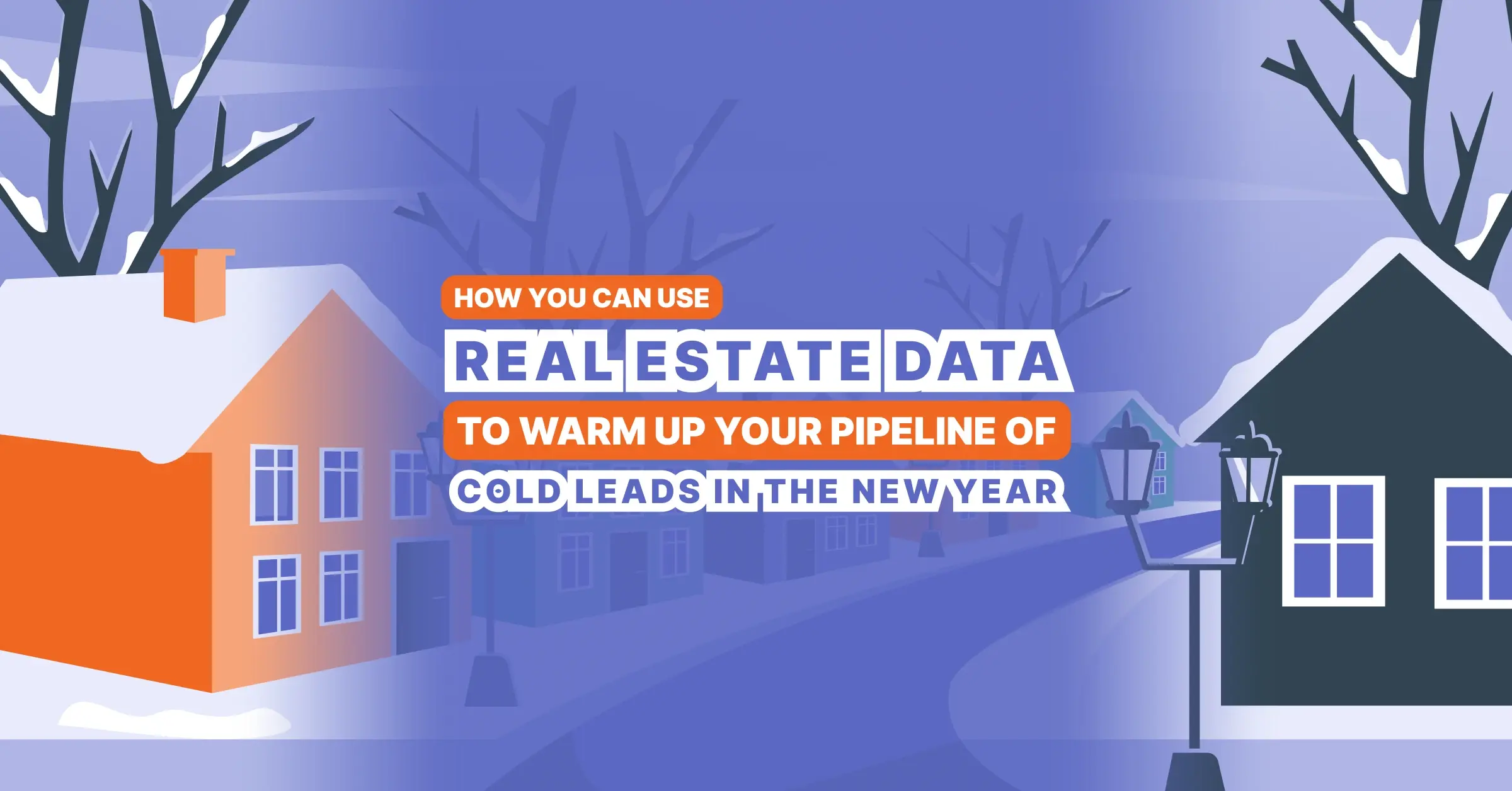Disclaimer: This article is for informational purposes only and does not constitute legal or zoning advice. Zoning laws and regulations vary by region, so real estate professionals should stay informed about their local requirements before advising clients on vacant land opportunities.
|
Key Takeaways:
|
Residential properties tend to get most of the attention in real estate. Yet some agents are discovering the value of one largely overlooked group: vacant landowners.
Although demand for undeveloped land fluctuates, strategic buyers like developers and investors are always seeking the right parcels in growing markets. This means vacant land leads can be a lucrative niche if agents know how to identify and market to them.
In this article, we share best practices for finding and working with landowners. But first, let’s explore why agents should consider adding this niche to their business strategy.
Table of Contents |
Why Agents Often Overlook Vacant Land Leads
Vacant land is undeveloped land that isn’t currently being used and usually has no structures on it. Most agents avoid it because they think it’s harder to sell than residential properties. Some also assume marketing is more difficult since land can lack the curb appeal of beautifully built homes. Others are wary because they fear they’ll work harder for less pay.
Try PropStream for 7 Days Free!
In reality, though, vacant land can be a stable source of business—and, in some cases, higher commissions—if agents know how to find leads and market effectively. Although nationwide demand has dipped recently due to cooling buyer activity, many local markets remain hotbeds for land deals.
The Untapped Value of Vacant Land Real Estate
There are several prominent reasons agents should consider working with landowners:
- Less complexity (in some ways): Land transactions skip steps like inspections, appraisals, and showings, though due diligence on zoning and utilities can be more nuanced.
- Repeat business: Investors often buy multiple parcels, and developers typically plan several projects in advance, creating opportunities to build long-term relationships.
- Opportunities for upselling: Upselling can involve connecting with nearby landowners interested in selling, breaking up a large parcel into multiple smaller lots, or even getting a parcel rezoned for commercial use.
How to Find Vacant Land Leads

Traditionally, finding landowners hasn’t always been a straightforward process. Some of the most common ways to find vacant land leads involve:
- Visiting the county clerk’s office
- Scouring government websites
- Asking neighbors for information
- Hiring a title company to run a search
However, these methods can be time-consuming and sometimes costly. Also, what you find is not guaranteed to be accurate since most counties only update their information annually.
Nowadays, though, finding landowners can be as simple as using PropStream’s Vacant Land Lead List. You can quickly locate opportunities nationwide, then use our *skiptracing services to get owners’ contact information.
NEW! PropStream Academy Course: Investing in Vacant Properties.
This course contains valuable information about finding vacant leads as an agent.
Best Practices for Working With Vacant Landowners
There are several components to selling land compared to residential property that are worth noting. Consider the tips below when working with vacant landowners:
1. Tailor your messaging
Be sure to highlight the benefits of selling unused land. Remind landowners that holding onto vacant land incurs costs like property taxes. In contrast, selling could free up capital to invest in assets that generate rental income.
2. Do your research
Before working with landowners, be sure to research zoning regulations and permits, which directly affect how land can be used and, as a result, how you market it.
Next, get a feel for buyers’ motivations for purchasing a particular lot, whether it’s to develop it, turn it into farmland, or use it (or rent it out) for hunting or camping. Lastly, look into construction costs, which will help you determine competitive pricing.
3. Use creative marketing strategies
Instead of simply listing the parcel on the MLS, consider also marketing it within investor or builder networks. Don’t forget to highlight the potential ways a buyer could use the land, keeping in mind its current zoning.
Professional photography and drone imagery are other great ways to highlight the land’s potential, size, natural resources, and proximity to nearby amenities.
4. Keep the land clean
Consider clearing away thick weeds and overgrowth, which are not only unattractive but can also make the land look smaller. Be sure to get rid of any dilapidated structures or machinery on site, too.
Why Top Agents Use PropStream for Vacant Land Leads
When looking for vacant land leads, you want the most accurate, up-to-date information available. PropStream provides access to 160+ million property records with ownership, tax, and MLS data, so you can quickly update static lead lists.
You can also find leads before they hit the market. Simply search for motivated landowners by filtering for length of ownership, absentee parcels, and tax delinquent lots. Then, skip-trace their information and start reaching out.
Although vacant land leads don’t get as much attention from agents, they represent hidden opportunities for repeat business and long-term clients. Diversify your lead sources by exploring vacant land datasets, such as PropStream’s, and become the go-to expert for this underserved niche!
Start uncovering hidden opportunities with PropStream’s Vacant Land Lead List today.
Frequently-Asked Questions (FAQs)
What makes vacant land leads valuable compared to traditional residential leads?
Vacant land often comes with motivated sellers, lower competition, and opportunities for investors, builders, or developers.
How can I find and qualify vacant land leads effectively?
Many agents use property data platforms like PropStream to filter by land type, ownership length, equity, tax status, and more to pinpoint strong prospects.
What should I look for when evaluating the potential of a vacant land parcel?
Key factors include zoning, location, access to utilities, topography, and local development trends.
Are vacant land owners typically harder to contact than homeowners?
Yes, because many parcels are owned by absentee owners or investors. Skip tracing and direct mail can help bridge this gap.
Learn more about skip tracing with PropStream here.
Do I need special knowledge to advise clients on buying or selling vacant land?
Absolutely—agents should understand zoning laws, permitted uses, and local development regulations to guide clients responsibly.
Subscribe to PropStream's Newsletter
*PropStream engages an independent third party to perform skip-tracing.



